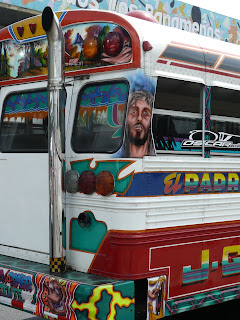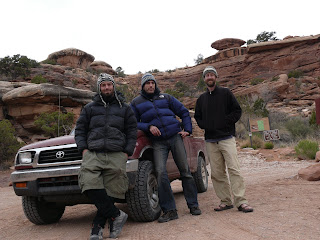


I spent a week in the little Caribbean village of Puerto Lindo talking to boat captains about working in return for free passage to Columbia. Going rate right now is almost $400, and though I could pay that, it hardly seems worth it. I learned a lot that week about owning a sail boat. Mainly, that they are bottomless labor and money pits. This put grease spots on the romantic vision I had about using the wind’s power to propel myself around the world for free. Besides that, having a boat anchored in the harbor makes you a target for theft. One middle aged couple had been boarded by thieves the previous night and had to chase them off with a machete. Just about the time I was ready to throw in the towel and head north, I got an offer to work on getting a wooden sailboat in working order in trade for passage to Columbia. We would be anchored in Puerto Lindo working until January 6, but first we had to go to Miramar to pick up the boat.
The captain (Captain J), the guy who was buying the boat (Guido) and I pulled up to the dock and were greeted with a cold indifference. Apparently the French guy who sold the boat was not liked by anyone in the town, because they didn’t want to let us use their power outlets or even the bathrooms, and these are Gringos I‘m talking about. We finally got them to let us use power for the welder with a promise that the quicker we got power the quicker we would be out of there. When the welding was finished Guido packed up the welder and said he’d be back in a day or two to pick us up. Captain J and I were left with a rundown boat and a marina where we weren’t welcome. When we walked into the town things got worse. We were looking for a meal, and whenever we would approach people happily chatting at various tables would stop chatting, frown and tell us that they had no food. This happened a few times and finally when we did find a place willing to take our money we were served haplessly. This was gong to be a long two days.
At the end of the second day Captain J hung up the phone with Guido, and happily informed me that we would be picked up tomorrow at 10am. “I bet you a dollar we won’t,” I replied, hating to deflate his happiness, but hoping to at least cash in a little on our misery. Today was Christmas Eve and tomorrow, Christmas. We hadn’t heard a single Christmas song . My spirits were pretty low, dampened by sweat , mold, and the oily rat dung and cockroach infested water I had been pumping and sponging up from the bilge all day. It hurt to look at my watch, because every time I did, less and less time would pass.
Our best friends in Miramar were the two narcotics police who seemed to be about as happy to be there as we were. They would start drinking at breakfast and by afternoon be happy to shoot a game of pool with us at the local open air bar. The strange thing about that town was that people had nice cars, satellite dishes on their roofs and gold capped teeth, but no one seemed to work. Captain J said this was the sign of a mafia town. We asked the owners of the dock about this and they agreed. They told us a story about this area and about a group of tourists who found a “package” that had washed up in the mangroves. Of the three of them, one went missing, one was hit by a car and the other was found with a Columbian necktie. If you’re wondering, like I was, what a Columbian necktie is, it’s when they cut your throat and pull your tongue out and down your chest. “That must take a lot of practice to do right,” Captain J mused after the description. I agreed.
On Christmas morning we didn’t even bother trying to find a place to eat. The previous day’s breakfast was humiliating. After ordering we watched about ten people show up, get served whole fish , and leave. We were the last to get served and all we got was some little fish tails and fried plantains with a single drop of tomato sauce. Instead we decided to go for a walk to the neighboring town.
The walk between the towns was beautiful. Sea to one side of the road and rolling hills with palm trees on the other. As we got closer to the next town we could see that people were gathered in the street. The closer we got the wilder the scene. The people were all drunk. It felt, as Captain J observed, like Dusk ‘til Dawn. We wanted to turn around, but at the same time we didn’t want to show fear. Fortunately, a guy ran up to us from a house at the edge of town and invited us in. It was our security guard from the dock who hadn’t shown up the night before. He was a kid in his upper teens or lower twenties, and when he got closer we saw that his normal smile was obscured by cuts and bruises. We couldn’t understand what he said had happened, but it was clear that they beat him up pretty bad. “Peligroso (danger).” was the one thing we did understand. We were thankful that it appeared that we had a reason for being there, and that we could go back the other way without losing face.
I cooked some spaghetti that I found in my pack that night. I was grateful that I had splurged for some parmesan the last time I went to the store. The generic brand parmesan cheese was the highlight of my Christmas.
Guido ended up showing up the next day with a big truck. He and Captain J took the boat back to Puerto Lindo, and I went with the truck driver. The driver stopped twice for beers during the two hour drive. When we got there I waited for the boat and then informed them that I really didn’t need a ride to Columbia anymore. During the four days over Christmas the boat began to feel more like a coffin than a seagoing vessel, and though Puerto Lindo was much nicer than Miramar, I was overtaken by the need to be free.
The experience in Miramar is disappearing from my memory much the same way you forget a zit as soon as it goes away even though while you had it, it was the only thing you saw when you looked in the mirror. I’m back in Panama City with all of the creature comforts I could ever want. It’s breakfast time. I think I’ll have eggs today.






































